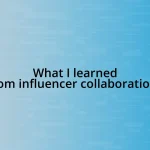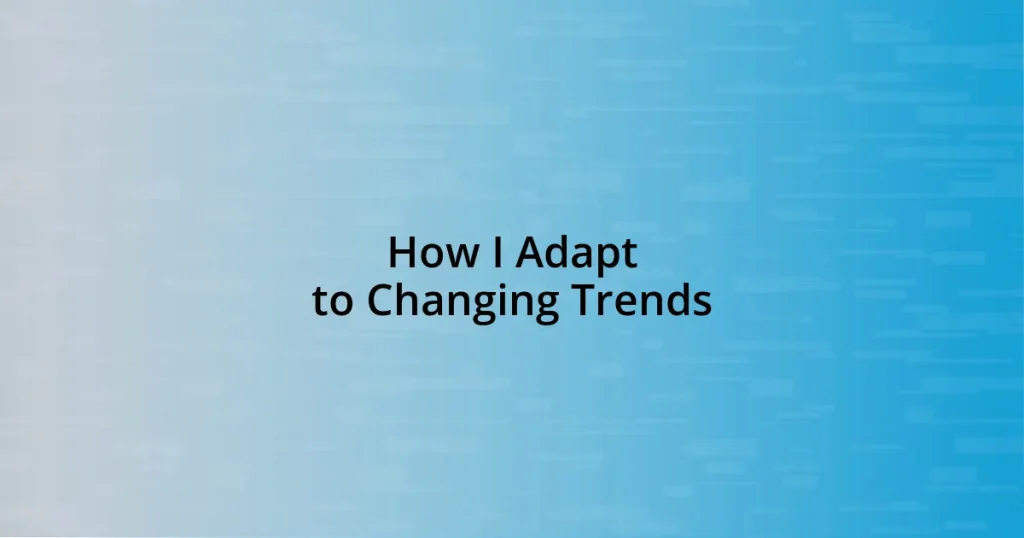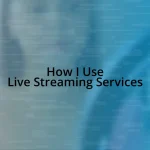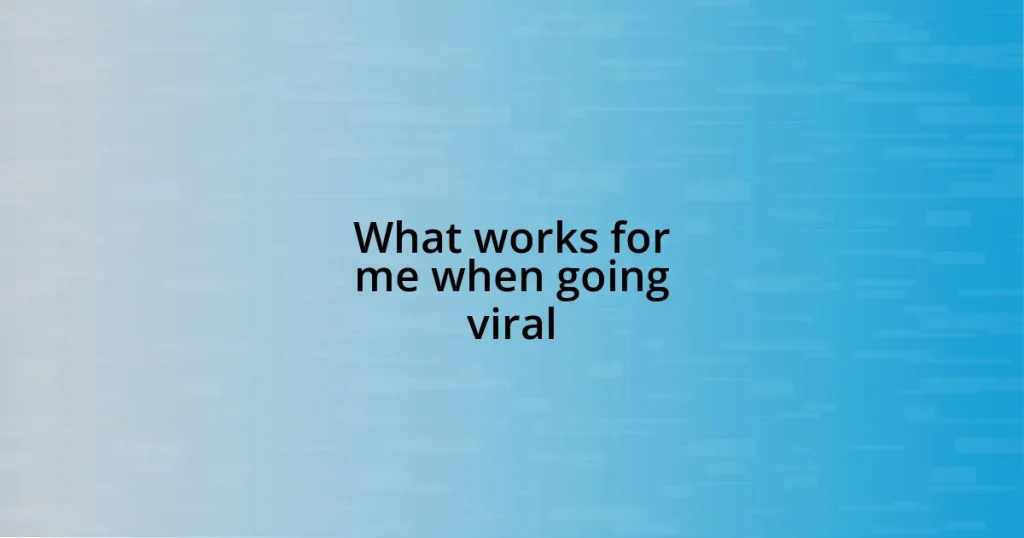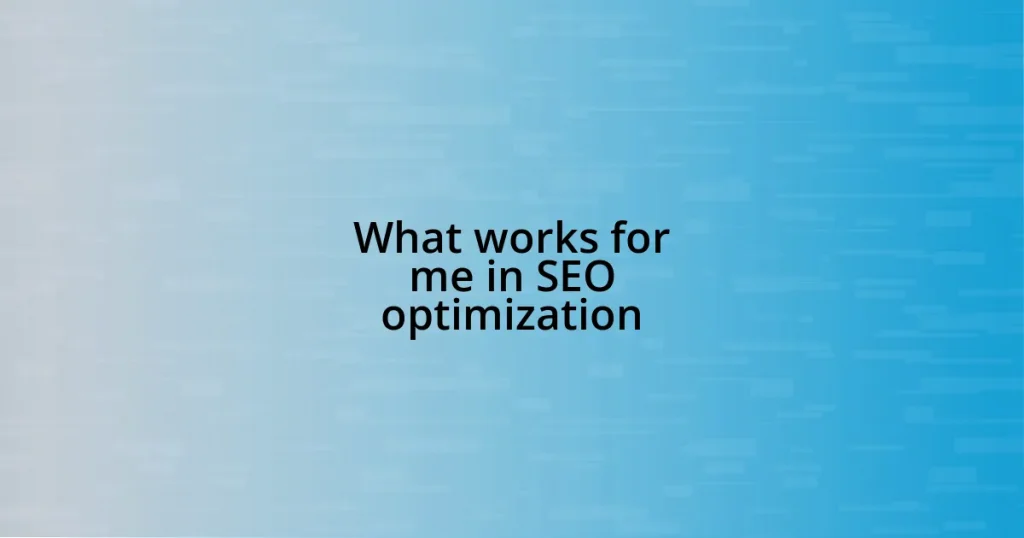Key takeaways:
- Adaptation is vital for success, enabling individuals to thrive amid constant change and uncertainty.
- Identifying trends involves actively engaging with various sources, such as industry webinars, newsletters, and analytics tools.
- A flexible mindset is essential for embracing change, requiring self-reflection and openness to new perspectives and feedback.
- Implementing small, manageable changes in routine is more effective than drastic overhauls, and accountability can enhance motivation.
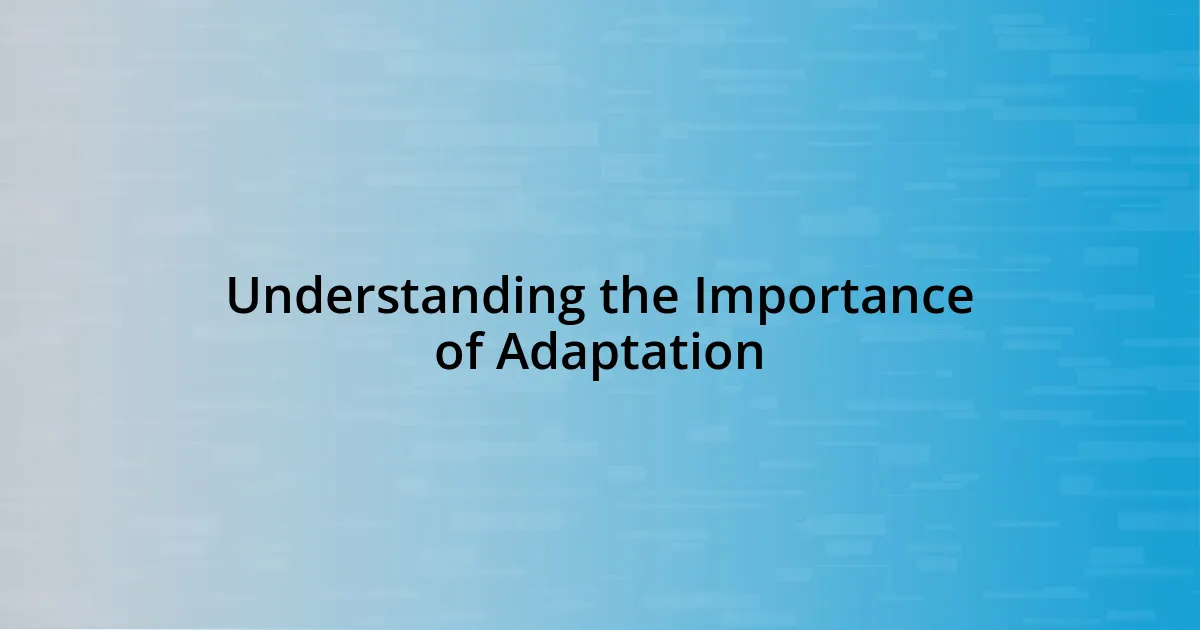
Understanding the Importance of Adaptation
Adaptation is crucial in a world that is constantly shifting. I remember when social media began its rise and the landscape changed overnight. Those who refused to adapt found themselves left behind, while those who embraced it thrived. Don’t you think it’s fascinating how the willingness to change can define success?
Consider this: every time I faced a trend shift, it was an opportunity masked in uncertainty. I vividly recall when remote work surged during the pandemic. Initially, I struggled with the transition, but once I embraced new tools and strategies, my productivity skyrocketed. Isn’t it empowering to realize that each challenge can be a stepping stone toward growth?
At its core, adaptation is about resilience. When I think about my experiences, I see how flexibility not only helps in navigating changes but also fosters innovation. Have you ever stopped to ponder how your ability to adapt can open doors to new possibilities that you may not have even considered? Embracing change is not just a survival tactic; it’s a powerful strategy for thriving in an evolving environment.
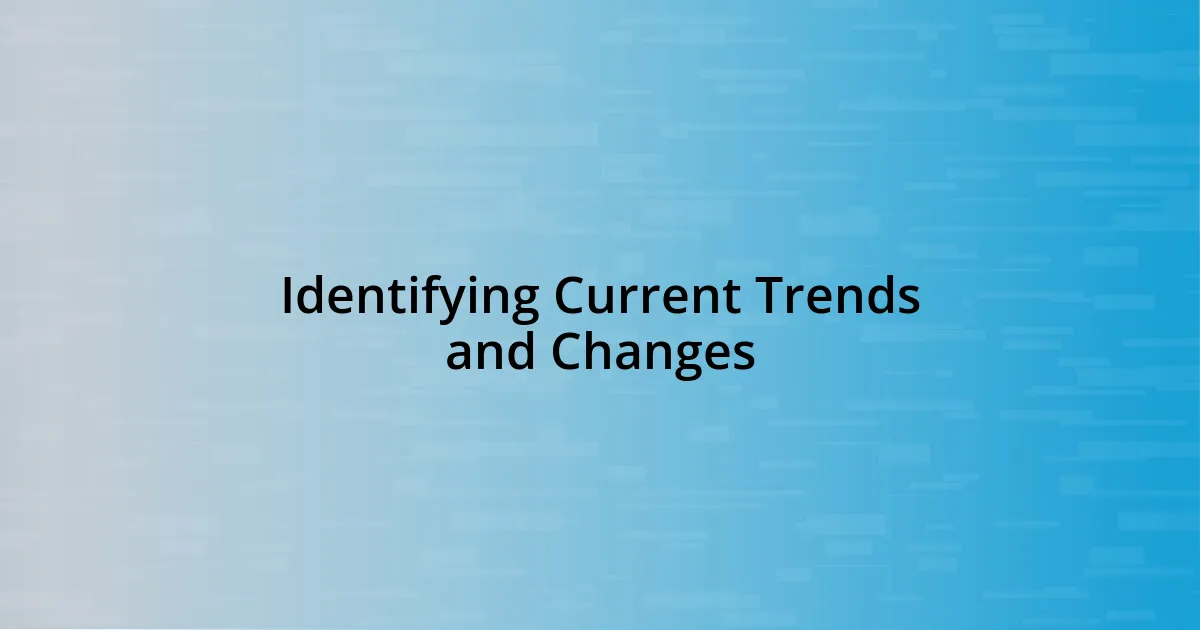
Identifying Current Trends and Changes
Identifying current trends and changes can feel overwhelming, but I’ve discovered that keeping my eyes and ears open to different sources makes a big difference. For instance, attending industry webinars and following influencers on social media has been my go-to strategy. I often find that these interactions spark new ideas or highlight shifts I hadn’t noticed before.
- Subscribe to newsletters relevant to your field to get curated updates.
- Participate in online forums or groups where information is shared quickly.
- Monitor competitors to see how they are adapting; sometimes their moves can offer valuable insights.
- Leverage analytics from online platforms to understand what content resonates with audiences.
Understanding trends isn’t just about collecting data; it’s about feeling the pulse of your environment. I remember when podcasts exploded in popularity. I started to listen to various topics, and this not only broadened my perspective but also inspired me to explore a new niche in my work. The key is to remain curious and allow yourself to evolve alongside these changes.
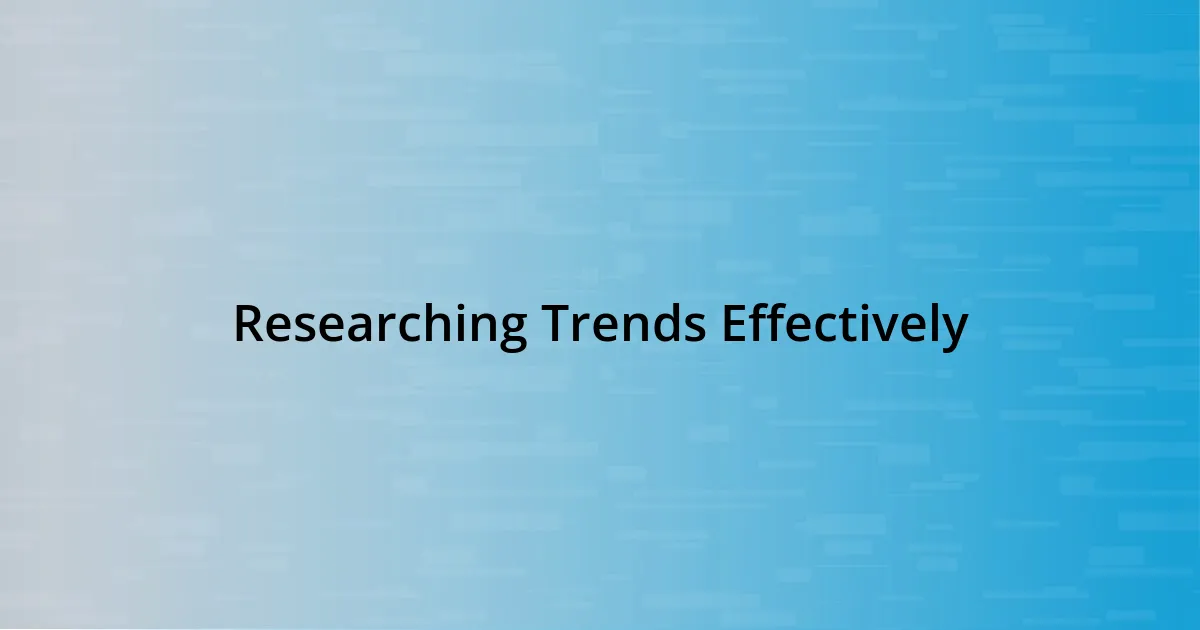
Researching Trends Effectively
Researching trends effectively is an essential skill that I’ve honed over the years. I often start by diving into online marketplaces and forums where discussions around emerging trends flourish. For example, I found that Reddit threads frequently unveil insights that mainstream sources might overlook. Engaging in these platforms allows me to gather real-time feedback from consumers and industry experts alike. Have you ever noticed how community-driven insights can lead to a richer understanding of what’s truly happening?
Using tools like Google Trends has transformed my research process. By simply searching a keyword, I can track its popularity over time and across different regions. I recall researching a new product launch and being amazed at how certain keywords spiked during particular months. This data enables me to adapt my strategies proactively instead of reactively. Isn’t it striking how data can empower us to make informed decisions?
Another strategy I find invaluable is networking with thought leaders in my field. Attending conferences, even virtually, often sparks enlightening conversations that reveal upcoming shifts. I remember chatting with an industry veteran who shared insights about a trend that prompted me to pivot my approach. It’s moments like these that remind me: striking up a conversation can lead to discovering the next big trend.
| Research Method | Benefit |
|---|---|
| Online Forums | Access to community-driven insights and real-time discussions |
| Google Trends | Tracks keyword popularity over time for proactive decision-making |
| Networking Events | Fosters connections with experts and uncovers emerging insights |
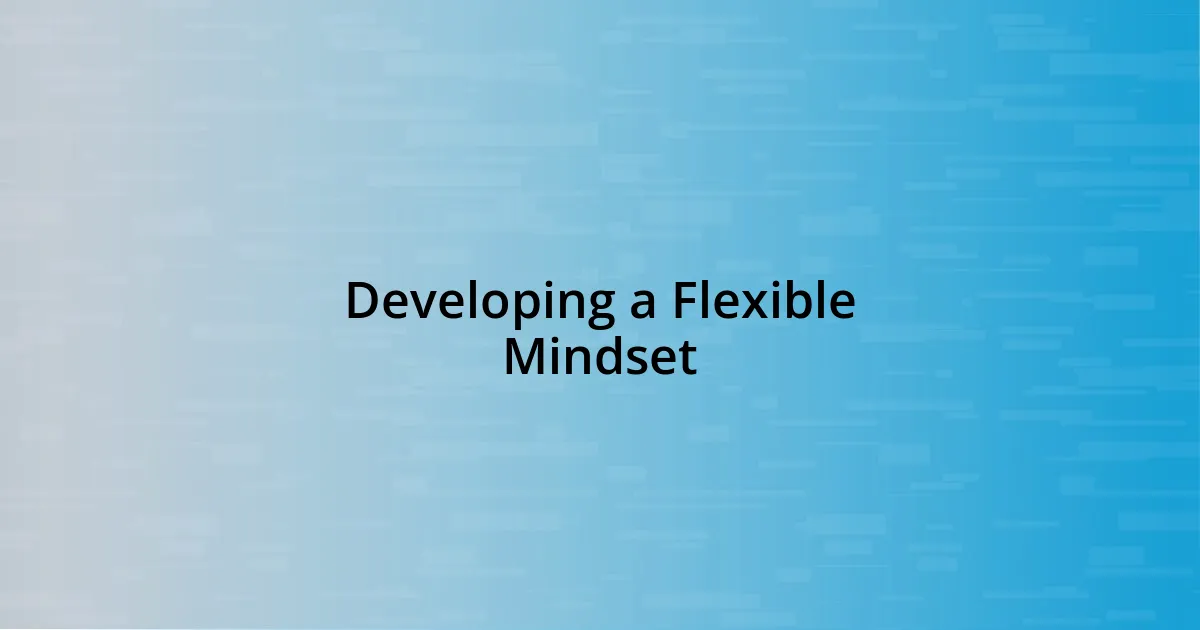
Developing a Flexible Mindset
Developing a flexible mindset has been a game-changer for me, especially in an ever-changing world. I remember feeling the weight of uncertainty when a new technology emerged, threatening to outdate my skills. Taking a step back, I realized that flexibility isn’t just about adapting—I had to be open to learning and unlearning. Have you ever found yourself clinging to old methods when the landscape around you was shifting? I certainly have, but once I embraced the idea of continual growth, I noticed opportunities instead of obstacles.
One key realization in my journey has been that a flexible mindset requires constant self-reflection. I often ask myself questions like, “What are my areas of resistance, and why?” This process isn’t easy; I vividly recall a time I resisted feedback after a project. After reflection, I let go of my defensiveness and approached the feedback with curiosity, which, as I learned, is the true essence of flexibility. Each piece of feedback became an invaluable lesson, reinforcing my belief that being receptive can unlock new paths forward.
Another aspect I’ve found crucial is surrounding myself with diverse perspectives. When I deliberately sought out different viewpoints, I marveled at how much I learned from people outside my usual circle. Just last month, I had a conversation with a friend from a completely different industry, and their fresh take on adaptability made me rethink some of my own strategies. This reinforces a valuable insight: fostering a flexible mindset means you’re willing to step outside your comfort zone and embrace the unknown. Why not view change as a chance to innovate rather than a hurdle to overcome? Every shift can become a stepping stone if we let it.
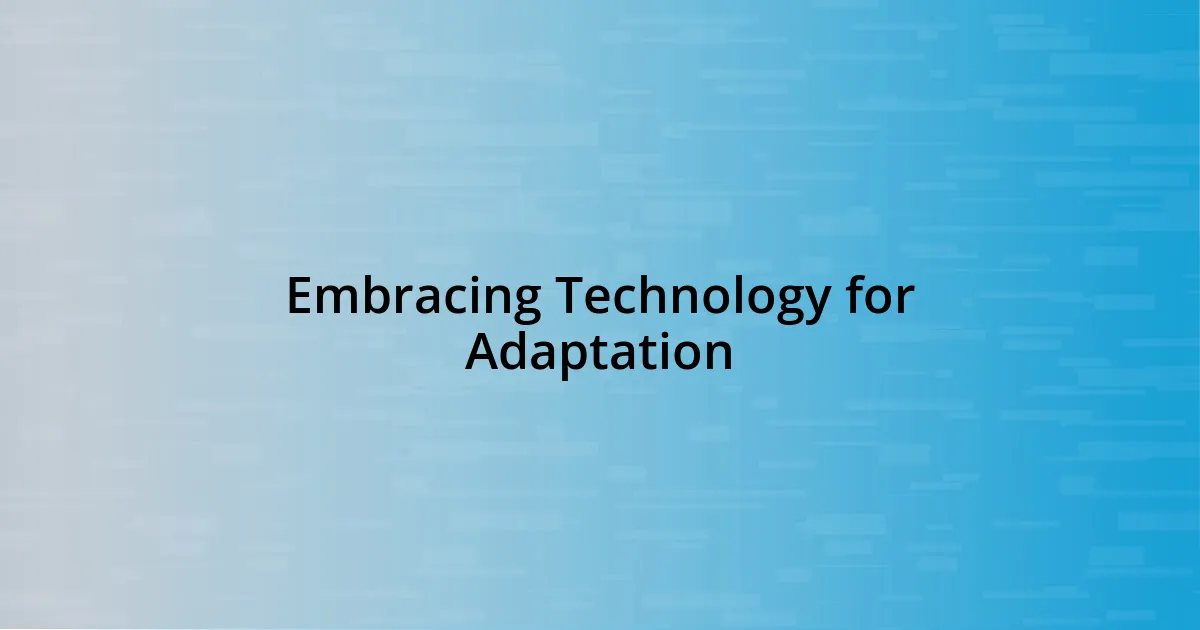
Embracing Technology for Adaptation
Embracing technology has truly been a pivotal part of my adaptation journey. I remember when I first started using project management software to streamline my workflow. Initially, it felt overwhelming, like learning a new language. But as I delved into the features, I realized how it helped me stay organized and meet deadlines more efficiently. Have you ever had that “aha” moment when a new tool suddenly makes life easier? I certainly did, and it’s been an essential aspect of how I manage change.
I also find that social media platforms offer incredible opportunities for adaptation. For instance, during the pandemic, I turned to Instagram not just for social interaction but as a vibrant marketplace for innovative ideas and trends. By following influencers and thought leaders, I discovered new methods to promote my work with greater engagement. It’s fascinating how a simple scroll through my feed can spark inspiration! Have you considered how much insight we can gain from our online communities?
Moreover, I’ve explored augmented reality (AR) in brainstorming sessions with my team. Last year, we experimented with AR tools to visualize concepts for a project. The experience was eye-opening; it fostered creativity and collaboration in ways we hadn’t experienced before. It made me think: how often do we underestimate the power of technology in enhancing teamwork? Engaging with these tools not only excites me but also propels my adaptability, allowing me to stay ahead in a fast-moving environment.
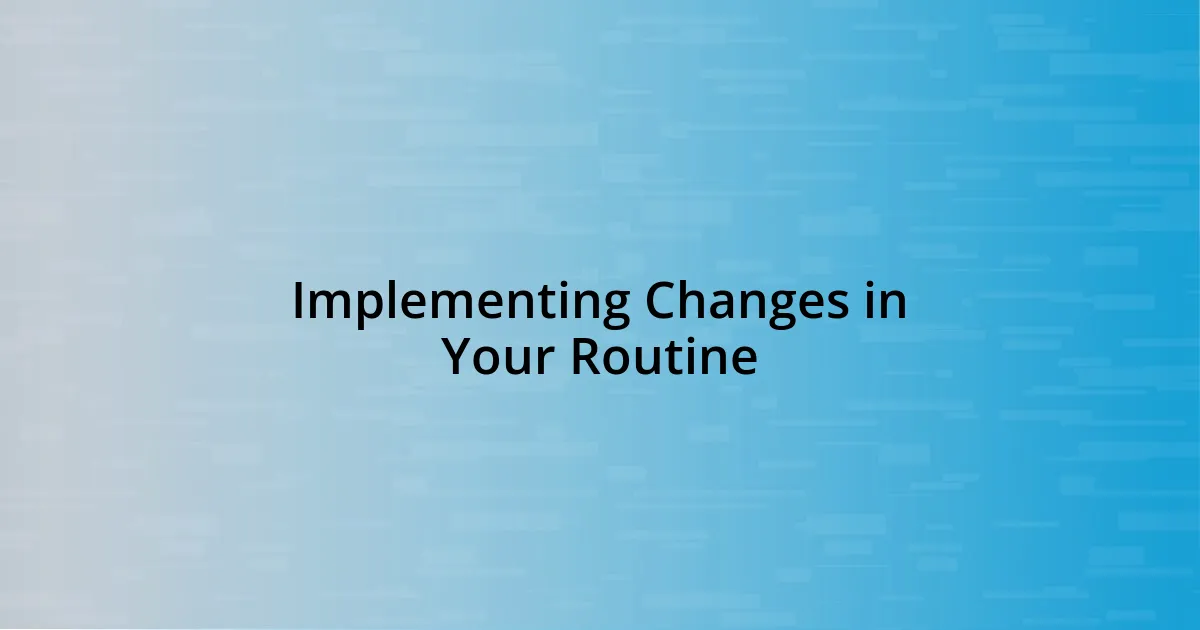
Implementing Changes in Your Routine
Implementing changes in my routine is often about small, manageable steps rather than sweeping overhauls. I recall a time when I felt overwhelmed by the urge to transform my daily habits to fit new trends. Instead, I started by changing just one thing at a time, like dedicating my mornings to reading instead of diving straight into emails. This approach not only felt more attainable but also allowed me to gauge how each change affected my productivity and mindset.
I also learned the power of accountability. Not long ago, I joined a group where members shared their goals and progress related to lifestyle changes. At first, I hesitated to share my plans, fearing judgment. Yet, when I opened up, I discovered how motivating it was to have a support system cheering me on. It made me wonder: have you ever felt the weight of isolation when trying to implement new habits? I found that simply vocalizing my intentions helped solidify my commitment to change, creating a ripple effect of motivation within the group.
Sometimes, integrating change into my routine requires a touch of creativity. Recently, I explored the idea of gamifying my goals to make the process enjoyable. For example, I set up a system where I earned points for every new habit I maintained, turning what could have been a dry task into a fun challenge. It led me to ask myself, how can we brighten up routines that feel stale? I was amazed at how a playful approach transformed my perception of daily tasks from burdens into exciting milestones. This small shift had a significant impact on my enthusiasm for implementing change.
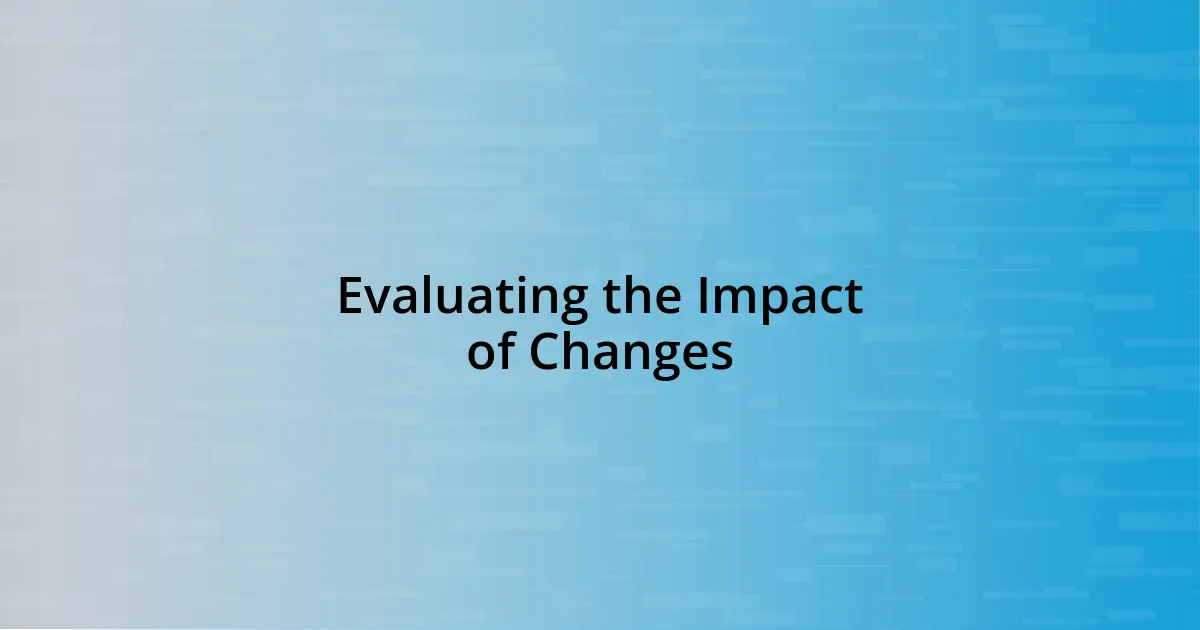
Evaluating the Impact of Changes
Evaluating the impact of changes in my life is like peering into a kaleidoscope. When I try something new, I take a moment to reflect: what did I gain, and what did I lose? For instance, when I shifted from traditional media to digital marketing, I noticed some strategies lost their effectiveness, but I gained greater audience reach and instant feedback. It made me realize that every change, no matter how small, carries both risks and rewards.
One of the most revealing experiences I had was during a major project rebranding. I actively solicited feedback from my team and even clients, which opened my eyes to perspectives I hadn’t considered. At times, their insights were tough to hear, yet they pushed me to look beyond my initial assumptions. Have you ever let others’ feedback reshape your approach? It’s a humbling experience that can lead to growth if you’re open to it.
On a personal note, I document my experiences in a journal, which acts as a barometer for change. I once reviewed my entries from a year ago and was surprised at the progression in my thoughts and emotions. What amazed me was seeing how often I repeated concerns! It made me wonder if I was truly learning from my experiences or just cycling through similar challenges. This practice of reflection doesn’t just help in assessing the impact of change; it empowers me to be proactive in steering my future.








